Male depression and emotional struggles are often overlooked in today's mental health conversation. Depression impacts millions of men globally. When it comes to relationships, male depression symptoms can lead to emotional affairs. This creates complex situations that often go unnoticed and untreated.
The Hidden Crisis of Male Mental Health
Men face serious emotional struggles and depression. They are much less likely to seek help for these issues than women. The National Institute of Mental Health (NIMH) reports that women are diagnosed with depression twice as often as men. However, men die by suicide at four times the rate of women. This shows that male depression usually goes unnoticed and untreated.
Understanding male depression is important. Many men hide their emotional pain. They often act in ways that seem like character flaws. But these behaviors can actually signal serious mental health issues. This masking often leads to relationship problems, including emotional disconnection and affairs.
Breaking Down Barriers to Help
Addressing men's mental health matters because it affects more than just the individual. It impacts families, relationships, and whole communities. Statista reports that men are 30% less likely to get help for mental health issues. This leads to higher rates of substance abuse and relationship problems.
To reduce the stigma around men asking for help, we must understand how cultural views on masculinity block emotional openness. Society tells men that showing emotional pain is weak. This belief can lead to hiding feelings and, often, depression. As a result, men may express their struggles in harmful ways.
Understanding Male Depression
Male depression often looks different from female depression. This can lead to misdiagnosis or the omission of symptoms entirely. Research from mental health groups shows that men often hide their depression from their partners and loved ones.
How Male Depression Differs
Male depression differs from female depression. Men often show it as anger, irritability, or risky behaviors. This is unlike the sadness and withdrawal usually linked to depression in women. The American Psychological Association says men might show depression through physical signs. This can include fatigue, sleep issues, or loss of appetite. Often, they don't see the emotional side.
Hidden depression in men often shows up as increased aggression, substance abuse, workaholism, or risky behaviors. These symptoms may be attributed to stress or personality traits. But they can also show a serious mental health condition.
The Overlooked Nature of Male Depression
Hidden depression in men is common. Healthcare providers and the men themselves often miss symptoms. Many depression screening tools focus on how women feel depressed. This may overlook how men show emotional pain.
This oversight helps explain why men often get poor mental health care. It explains why depression can get worse before people find help. This often leads to broken relationships, emotional affairs, and personal crises.
Challenging Misconceptions
Misconceptions about men and their emotions exacerbate the issue. They reinforce the notion that men should handle emotional issues on their own. Cultural messages often deter men from seeking help. They also make it hard for partners to see real mental health issues.
Common Symptoms of Male Depression
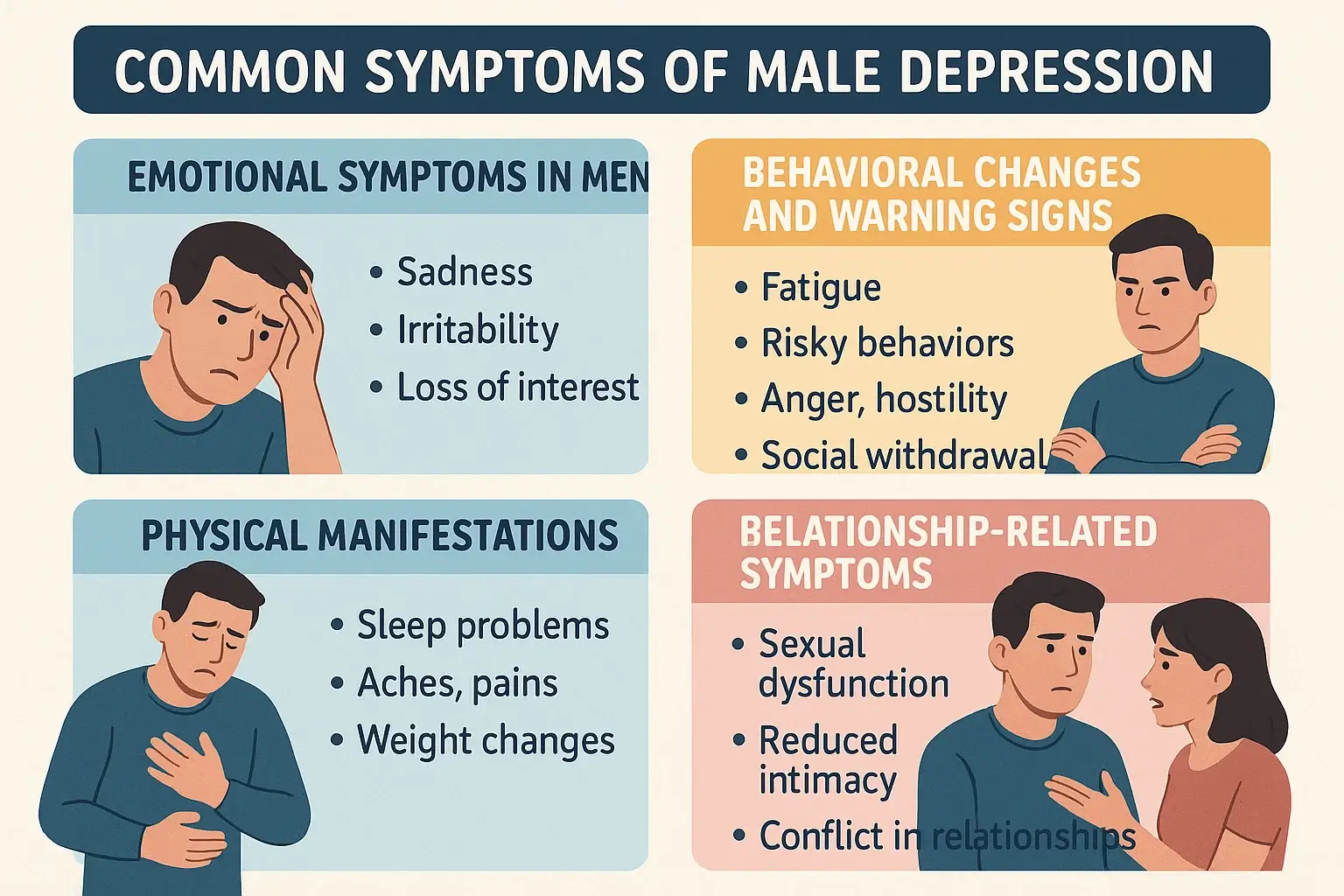 Recognizing male depression involves noticing its impact on emotions, behavior, physical health, and relationships. Men's depression symptoms can show up in surprising ways. These signs often don't match common ideas about depression.
Recognizing male depression involves noticing its impact on emotions, behavior, physical health, and relationships. Men's depression symptoms can show up in surprising ways. These signs often don't match common ideas about depression.
Emotional Symptoms in Men
Emotional symptoms like irritability, anger, hopelessness, and guilt often replace sadness in depression. Research shows that men often show depression through anger and frustration. They tend to cry less or express sadness directly.
Depression impacts men in relationships by causing emotional symptoms. These symptoms can lead to distance, conflict, and misunderstandings between partners. Men might become more critical, impatient, or emotionally distant. They often don't realize why these changes happen.
Behavioral Changes and Warning Signs
Behavioral symptoms include:
- Risk-taking behaviors
- Social withdrawal
- Loss of interest in activities once enjoyed
- Changes in work performance
Depression triggers in men often appear as changes in behavior rather than obvious emotional signs.
Male depression and emotional disconnection often show up in a few ways. This can mean spending less time with family, doing less at home, or making sudden changes to social habits. These behaviors can strain relationships and create cycles of conflict, leading to further isolation.
Physical Manifestations
Physical symptoms of male depression often include:
- Chronic fatigue
- Sleep disturbances
- Changes in appetite
- Unexplained aches and pains
These issues are quite common.
The CDC notes that men often prioritize physical symptoms when seeking medical help. Because of this, they may overlook the emotional issues behind their problems.
Relationship-Related Symptoms
Relationship symptoms can include:
- Trouble expressing emotions
- Feeling distant from family and friends
- Issues with intimacy
Depression in men, along with a lack of affection, often points to deeper emotional issues. These struggles need professional help and support from partners.
Causes and Risk Factors
Knowing what causes male depression helps spot men at risk. It also offers ideas for prevention and early intervention.
Biological and Environmental Factors
Biological and hormonal factors affect male depression. This is especially true during midlife when testosterone levels drop. Research shows that hormonal changes can affect mood disorders. This link is less clear in men than in women.
Career, financial, and social pressures can cause stress. This stress can trigger or worsen depression in men. Economic uncertainty and job loss can cause career dissatisfaction. These issues often lead to depression in men.
Life Events and Trauma
Trauma, grief, or relationship breakdowns frequently precede depression in men. Men's mental health and issues with emotional intimacy often come from unprocessed grief, childhood trauma, or significant life changes. These experiences can shake their sense of identity and purpose.
Cultural and Social Pressures
Social stigma and cultural views on masculinity pressure men to hide their feelings. They often feel they must appear strong and in control. This cultural context helps explain why depressed men often seek emotional affairs. They use these relationships to meet unexpressed emotional needs.
Emotional Affairs and Their Connection to Mental Health
Emotional affairs can significantly impact men's mental health. They often lead to depression and relationship dissatisfaction. This mix can create harmful coping strategies.
Understanding Emotional Affairs
Emotional affairs involve strong emotional connections with someone besides a main partner. They differ from physical affairs, which affect sexual interactions. These relationships often include deep talks, emotional support, and romantic feelings. They don't always have to involve physical intimacy.
Depression can create emotional distance in men's main relationships. This often drives them to seek connection outside, leading to emotional cheating. Emotional affairs usually spark male depression, more so than physical ones.
Depression as a Contributing Factor
Emotional disconnection can lead to depression in men. This creates a cycle. Relationship problems increase depression, which then reduces satisfaction and intimacy in relationships. This cycle can make emotional affairs seem like a solution. However, they are often symptoms of deeper issues.
Emotional affairs can be coping mechanisms or warning signs. Emotional needs often go unmet in key relationships. People struggle to find healthy ways to cope. Men with depression might look for validation and support outside their relationships. They often don't realize they're doing this.
Impact on Mental Health and Relationships
Emotional affairs can hurt relationships and self-esteem. They also affect identity, especially when mixed with depression. Emotional affairs bring guilt and secrecy. This often makes depression worse. It also adds stress to relationships and creates trust issues.
Emotional affairs can indicate that a man may be depressed. This often means he needs professional help for his mental health. Relationship counseling is key. It helps address his depression and relationship problems at the same time.
Recognizing the Signs Early
Spotting male depression and relationship issues early can prevent serious problems. This recognition also leads to better treatment outcomes.
Warning Signs for Partners and Families
Partners and loved ones should watch for these warning signs:
- Gradual emotional withdrawal
- Increased irritability
- Changes in communication patterns
- Decreased interest in family activities
Early signs of depression in men usually show up as changes in personality instead of clear sadness.
Understanding the differences between stress, sadness, and clinical depression helps families respond to mood and behavior changes. Clinical depression persists beyond normal stress responses and significantly impacts daily functioning.
Red Flags in Relationships
Red flags of emotional affairs can show deeper issues. These include secretive communication, feeling distant from family, and seeking support from others while avoiding closeness with partners. These behaviors often indicate both depression and relationship problems that require professional attention.
Coping Strategies for Men
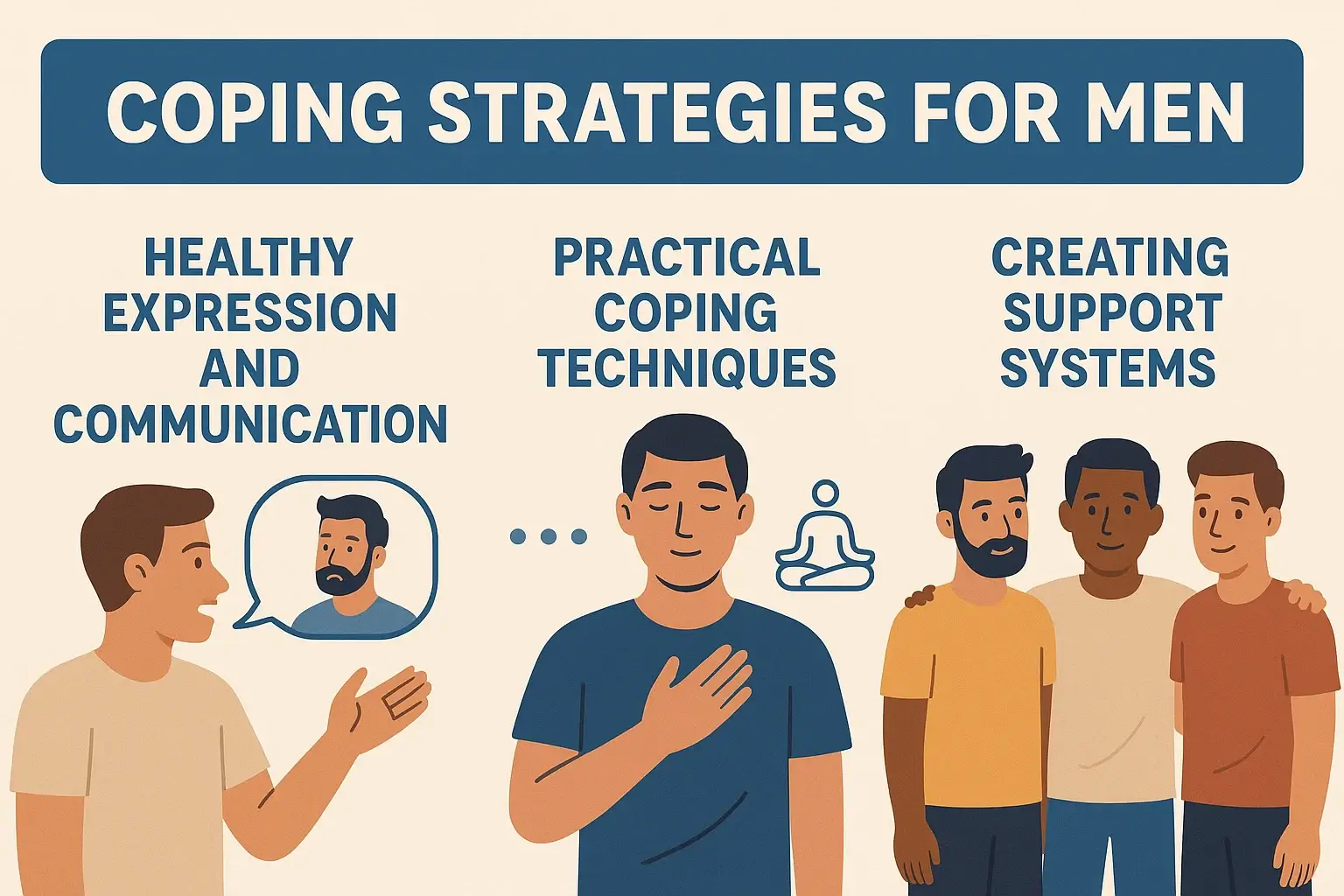 Healthy coping strategies help men manage depression. They also support relationship health and prevent harmful behaviors, like emotional affairs.
Healthy coping strategies help men manage depression. They also support relationship health and prevent harmful behaviors, like emotional affairs.
Healthy Expression and Communication
Healthy emotional expression and communication involve recognizing and sharing feelings positively and constructively. Men's mental health and emotional closeness can improve when they develop their emotional vocabulary and communication skills.
Coping with male depression in marriage means both partners need to discuss mental health. They should do this without blame or judgment. This communication lays the groundwork for mutual support and recovery.
Practical Coping Techniques
Mindfulness, journaling, and exercise are great tools. They help manage depression symptoms and boost emotional regulation. Research supports these approaches as effective complementary treatments for depression.
Setting boundaries in relationships helps build healthy dynamics. This helps with mental health recovery. It also prevents extra stress, which can make depression symptoms worse.
Creating Support Systems
Finding safe spaces helps men express their emotions. It helps them practice in supportive places before using these skills with loved ones. Men's support groups and therapy provide these safe spaces.
Professional Treatment Options
Professional treatment for male depression should align with how men feel and express their mental health challenges.
Therapy Approaches for Men
Counseling and therapy for men often emphasize practical problem-solving, goal-setting, and skill-building. They don't just focus on emotional processing. Cognitive Behavioral Therapy (CBT) is effective for many men. It offers clear tools to help manage thoughts and behaviors.
Group therapy, online therapy, and men-focused programs help men connect with others who share similar challenges and experiences. They also teach coping strategies in supportive spaces.
Medical and Holistic Treatments
Medication can help treat male depression when doctors recommend it. It's especially effective when paired with therapy and lifestyle changes. Healthcare providers can assess whether medication might be beneficial in individual cases.
Support groups and men-focused programs offer community support. This support enhances individual treatment and aids in long-term recovery.
Role of Loved Ones in Recovery
The partner plays a key role in helping men recover from depression. This can improve treatment success and strengthen the relationship.
Supporting Without Enabling
Partners, friends, and family members can support men by offering emotional support and encouragement. They should also encourage professional treatment and promote healthy coping strategies. Supporting a man with depression in a relationship means finding a balance between empathy and boundaries.
Open conversations, free from judgment, help men feel a sense of safety. This allows them to share their struggles without fearing criticism or rejection. This support helps counter the isolation that often worsens depression.
Creating Supportive Environments
Creating a supportive home and social environment means:
- Establishing routines.
- Reducing unnecessary stress.
- Maintaining connections.
- Respecting the recovery process.
Dealing with a depressed partner's emotional distance requires patience and professional guidance.
Long-Term Mental Wellness and Prevention
To build sustainable mental health, focus on lifestyle, relationships, and personal growth.
Building Resilience
Building resilience involves:
- Regular exercise
- Getting enough sleep
- Managing stress
- Keeping social connections
These habits help strengthen your ability to cope with stress.
These factors provide a foundation for long-term mental health.
Challenging toxic masculinity stereotypes helps build a culture. In this culture, men are encouraged to ask for help. They can also be vulnerable without fear.
Maintaining Relationship Health
Maintaining emotional health in relationships requires ongoing communication, intimacy, and mutual support. Men can often prevent depression and marriage issues by actively caring for their relationships and seeking mental health support.
Preventing relapse and managing long-term stress means building intense self-care routines. It also involves maintaining therapy and establishing support networks. These networks offer encouragement and accountability.
Conclusion
Understanding male depression and emotional affairs means looking at societal norms, biological factors, and relationship dynamics. These elements intersect, creating mental health challenges that impact families and communities.
Emotional unavailability in men is often linked to depression. This leads to cycles where untreated issues harm relationships. Then, these damaged relationships can make depression symptoms worse. Breaking these cycles needs a complete approach. We must focus on both mental health and relationship health simultaneously.
Male depression recovery stories show that healing is possible. Men can heal by getting the proper treatment. They also need to learn healthy coping skills. Rebuilding trust in their key relationships is vital too. Recovery takes time, support, and dedication from both partners. This helps build healthier relationship dynamics.
At Gendrics, we know that tackling male depression affects relationships. It needs specialized knowledge, caring support, and proven treatment methods. Men need mental health care that understands their unique experiences and perspectives. It should also offer practical tools for recovery and fixing relationships.
Seeking help for depression and relationship issues shows strength. It demonstrates that you prioritize your own well-being and that of your family. Professional support helps you handle challenges. It guides you to build healthier and more fulfilling relationships and lives.

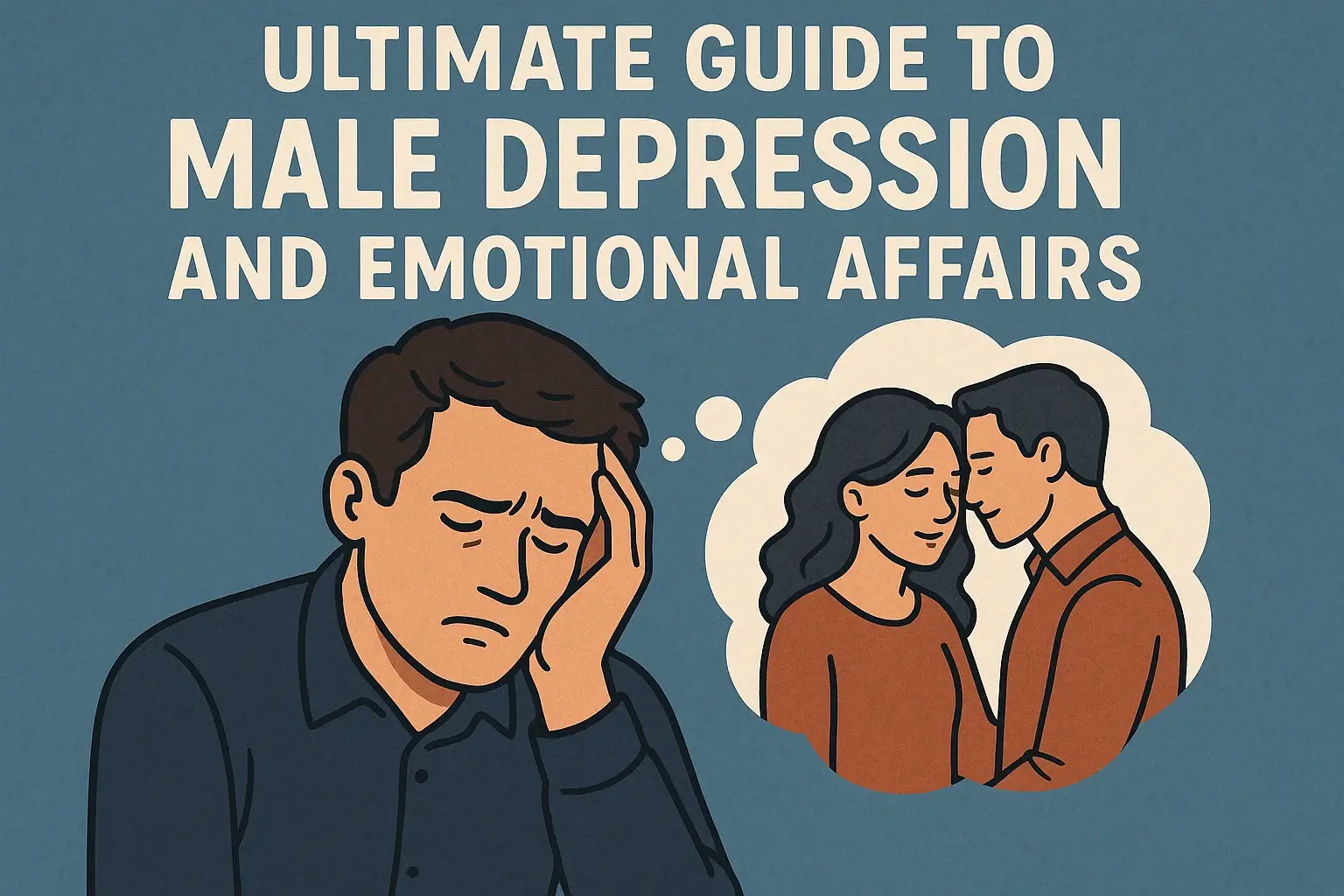
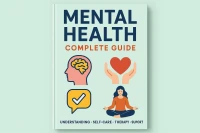


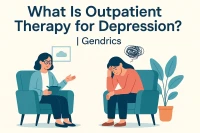
Comments